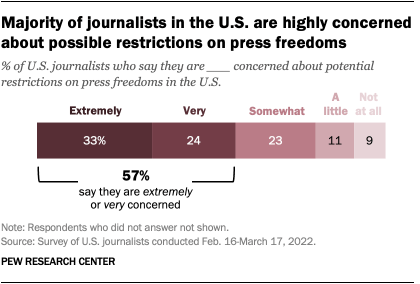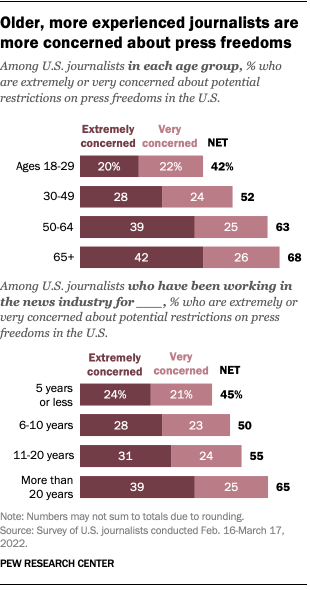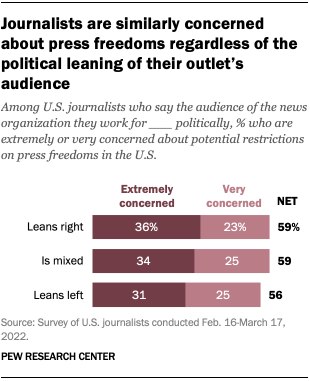Most journalists in the United States are concerned about the future of press freedoms in the country, according to a 2022 Pew Research Center survey of nearly 12,000 working U.S.-based journalists. This new analysis comes ahead of the 30th anniversary of World Press Freedom Day, which the United Nations recognizes on May 3 to highlight issues of press freedom and media ethics across the globe.

Roughly six-in-ten U.S. journalists surveyed (57%) say they are extremely or very concerned about potential restrictions on press freedoms in the country, including a third of journalists who say they are extremely concerned. Another 23% are somewhat concerned. Just one-in-five have low levels of concern about the future of press freedoms domestically.
This Pew Research Center analysis is based on a survey of 11,889 U.S.-based journalists who are currently working in the news industry and said that they report, edit or create original news stories in their current job. The survey was conducted online between Feb. 16 and March 17, 2022, by SSRS. A detailed demographic profile of the journalists who completed the survey can be found in the main survey report’s Appendix.
Because there is no readily available list of all U.S. journalists, Center researchers relied on commercial databases of journalists based in the U.S. as well as supplemental lists of news organizations to create a broad and diverse sample of more than 160,000 journalists from as many types of outlets and areas of reporting as possible. Although it is impossible to be certain every segment of the journalism profession in the U.S. is covered by the sample, the use of multiple databases and supplemental lists ensured that journalists from a variety of different reporting areas, news platform types, as well as outlet sizes and types – such as those who work for organizations that are intended to primarily reach a particular demographic group – were represented.
Propensity weighting was used to ensure that the responses of the 11,889 respondents aligned with the full sample of over 160,000 journalists with respect to job titles, media outlet type, freelance status and geographic location.
Read the topline for the questions asked of journalists in the survey. Refer to the methodology for more information on the development of the sample of journalists and the survey weighting.
Pew Research Center is a subsidiary of The Pew Charitable Trusts, its primary funder. This is the latest analysis in Pew Research Center’s ongoing investigation of the state of news, information and journalism in the digital age, a research program funded by The Pew Charitable Trusts, with generous support from the John S. and James L. Knight Foundation.
These concerns come at a time when the U.S. ranks 42nd in the world in press freedom, according to a 2022 analysis by Reporters Without Borders, and as some journalists face harassment or threats of arrest.
Concerns about press freedoms by journalists’ age, experience
Older journalists and those who have been in the news industry longer are especially concerned about U.S. press freedoms.

Roughly two-thirds of journalists ages 65 and older (68%) and ages 50 to 64 (63%) say they are extremely or very concerned about potential restrictions on press freedoms in the U.S. Smaller, yet sizable, shares of journalists ages 30 to 49 (52%) and those under 30 (42%) share these concerns.
In addition, about two-thirds of journalists (65%) who have worked in the industry for more than 20 years are extremely or very concerned about the future of press freedoms in the U.S., compared with a little less than half (45%) of those with five years of experience or less. This pattern persists even when accounting for age.
Concerns about press freedoms by type of news outlet
While the level of concern about press freedoms varies with journalists’ age and experience, it is fairly consistent across the types of news outlets that they work for.

For instance, U.S. journalists who say their news organization’s audience leans to the right politically, those who say their audience leans to the left, and those who say their audience is politically mixed are about equally as likely to express high levels of concern about potential press freedom restrictions. Those who say they work at outlets with right-leaning audiences are slightly more likely than those at outlets with left-leaning audiences to be extremely concerned (36% vs. 31%).
Journalists also have roughly similar levels of concern regardless of whether their outlet focuses on local, state, national or international news or whether its original platform is television, print, online, or radio or podcast.
Note: Here are the questions used for this analysis, along with responses, and its methodology.






